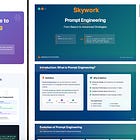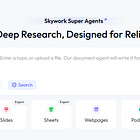The Windsurf–Anthropic Episode: A Masterclass in AI Ecosystem Risks for Entrepreneurs
The story of how Windsurf lost access to Claude models overnight — and the critical lessons this episode holds for AI entrepreneurs. Learn why platform fragility matters and how to build resilience.
What if your startup’s most critical tool vanished overnight?
That’s exactly what just happened — and it’s a cautionary tale every AI entrepreneur should pay attention to.
Over the past few months, Windsurf — one of the most loved AI-powered coding environments — became a go-to tool for developers. Part of its magic? The combination of a brilliant code-indexing experience and access to high-performance LLMs — particularly Claude Sonnet 3.5, Claude Sonnet 3.7, and others from Anthropic.
Developers raved about how Windsurf leveraged LLMs in tandem with its advanced semantic code search and context handling — offering one of the best coding experiences in the market.
But then — the story took a turn.
Anthropic & Windsurf conflict with each other
Late May 2025: Claude 4 was released (May 22, 2025), it’s most advanced and capable models ( Read more about Claude 4 here )
And shortly after Claude 4’s launch, Anthropic made an even bigger move: it withdrew API access to Claude 3.5 Sonnet and Claude 3.7 Sonnet for Windsurf entirely with just a 5 day notice.
Why?
Two potential reasons: Windsurf not given access to Claude 4
👉 Rumors of an OpenAI acquisition of Windsurf were swirling — now confirmed but the acquisition is in progress. OpenAI is reportedly acquiring Windsurf for $3 billion.
👉 Anthropic feared that Windsurf (and by extension, OpenAI) might be using Claude’s outputs to enhance its own SWE models and coding capabilities — a highly strategic area where both companies are competing.
Anthropic took swift action: Claude models were removed from Windsurf’s cascade.
Windsurf’s CEO Varun Mohan publicly expressed disappointment at the abrupt cutoff, noting the lack of prior warning and the impact on thousands of developers who had built workflows around Claude-powered experiences.
checkout their official statement here : https://windsurf.com/blog/anthropic-models
The Aftermath: Windsurf Response to Anthropic’s action
The developer community was in an uproar. On Discord servers, Twitter, and forums, the conversation was the same: "How can we trust these ecosystems when access can be switched off overnight?"
Windsurf responded by:
✅ Offering discounts on Google’s Gemini 2.5 Pro, which remains in the Windsurf cascade. Gemini 2.5 Pro ( next best advanced model) is offered at a discount at just 0.75 credits per call, compared to the typical 1 credit per call needed for top-tier models — an important advantage for users.
✅ Continuing to develop and improve its own SWE model family — something Windsurf had already been investing in well before this episode. This strategy now looks even smarter: owning a proprietary model family reduces dependency risks like this in the future.
But the lesson was already clear.
The Takeaway for AI Entrepreneurs
If you’re building with AI today, this episode is a critical case study. Here’s what it teaches us:
1️⃣ Dependency is dangerous
Windsurf built an incredible product — but part of its offering relied on external models. When access was revoked, a key portion of its value proposition was temporarily impacted.
If the API goes away, so does your product’s core value — unless you plan for it.
Entrepreneurs must ask: “If Anthropic/OpenAI/Google cuts me off, does my product still stand?”
2️⃣ Diversification is key
Smart platforms — like Replit, Cursor, and Windsurf — are learning to integrate multiple models and to invest in open-source backups (like Mistral, Meta’s LLaMA, DeepSeek).
The ability to switch models dynamically is becoming a critical survival feature.
3️⃣ Owning the stack matters
Windsurf’s prior investment in the SWE model family now looks visionary.
In AI, if you can’t own the full model stack, at least own the fine-tuning, the data, or the orchestration layer — something proprietary that protects your moat.
4️⃣ The ecosystem will remain fragile
Anthropic’s move wasn’t irrational — it was defensive and strategic.
As the race between model builders and platform builders intensifies, more such cuts will happen. Entrepreneurs must design with this fragility in mind.
Final Thoughts
This whole Windsurf–Claude episode feels like a harbinger of things to come.
AI is not an open playground anymore. It’s a competitive, strategic game where alliances will shift and APIs can vanish.
Entrepreneurs building in this space must:
Design for resilience
Plan for redundancy
Invest in flexibility
And always remember: Control what you can. Don’t assume what’s “available today” will be “available tomorrow.”
Check out my previous articles:






